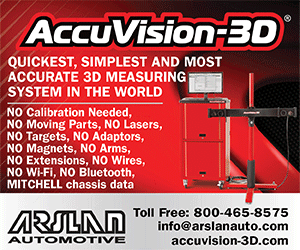What we know after a year of ARC’s Environmental Accreditation Program
— January 1, 2011 — In 2009, the Automotive Recyclers of Canada (ARC) won a contract to complete 350 environmental reviews at the automotive recyclers involved in the federal Retire Your Ride program. An environmental review in this case is defined as a two to three hour visit from a trained professional to review the recycler’s management of hazardous materials within the context of provincial and federal legislation.
The automotive recyclers who participated in this review stretched from St John’s, Newfoundland to Prince Rupert, British Columbia and in just about every community between.
Colin McKean, the manager of the Automotive Recyclers Environmental Association (AREA) in British Columbia, was contracted by ARC to train and coordinate three other professionals to share the load of the inspections. Patrick McMahon from New Brunswick, Alain Joyal from Quebec and Greg Thomas from Ontario were hired with Colin to ensure the ARC Environmental Code of Practice was delivered consistently and professionally from coast to coast.
The inspectors have many years of experience and they understand that their job is to provide “on-site” education and guidance on how to improve the environmental performance of recyclers. The inspectors focused on making the program informative and beneficial. The reviews were an enormous challenge and one of the biggest projects ever undertaken by ARC, but with the possibility of a growing number of vehicle recovery programs (e.g. the Recycle Your Ride, Cash For Clunkers, and Car Heaven retirement programs, and the Tacoma and Windstar buyback programs), the establishment of a national network of environmentally certified recyclers will have important benefits to the sector in the future.
“The national certification program for automotive recyclers will exceed 350 yards by the end of [2010] with overwhelming support from the industry,” said ARC managing director Steve Fletcher.
Because the inspectors quantify each inspection, they were able to glean some important statistics.
The average score for recyclers in the first year of the program was 79.4 per cent (with a standard deviation of 11.2 per cent). Graph 1.1 shows that the results followed a pretty normal distribution.
Note that recyclers who did not score more than 60 per cent on the assessment were temporarily suspended from the program until they improved their environmental performance.
Congratulations are in order for Mary Poirier of Valley Automotive for obtaining the highest overall score in Canada.
One of the issues ARC had to confront was ensuring that the results were consistent from one inspector to the next. To do this, the inspectors met a few of times over the summer, visited the same recycler and conducted inspections independently. Then the different inspectors shared the results and the reason for their scores. For the most part, all of the inspectors judged the recyclers similarly and the inspection scores were within a couple of percentage points of each other.
Where possible, recyclers who scored less than 70 per cent were subject to a re-inspection. So far, the recyclers that have been re-inspected have obtained significantly higher results the second time through the process.
“Most recyclers are simply not aware of the requirements to remove, store and transport hazardous materials,” McKean said. “Once you can explain the requirements in plain language, the recycler will make the necessary adjustments.”
Some recyclers were very nervous at having some one come on site to inspect their practices. But with the exception of a few people, everyone was pleased with the approach and the results.
ARC has big plans for its network of certified automotive recyclers. Steve Fletcher feels that vehicle manufacturers will be impressed with ARC’s approach and, in time, the network will form the basis of a more formalized stewardship program for end-of-life vehicles.
“Environment Canada has provided a critical start to creating a national network of accredited automotive recyclers from coast to coast,” Fletcher said. “It is now up to the automotive recyclers to build on this legacy.”


















